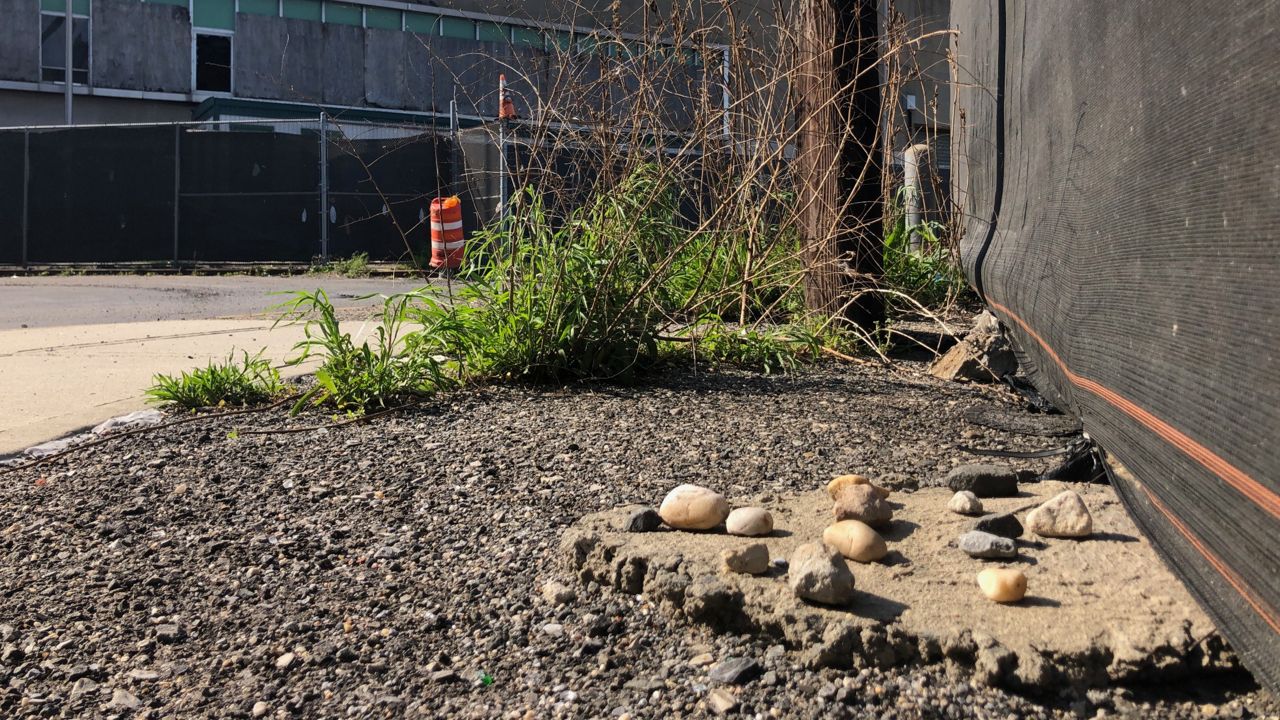Outside the entrance gate to the 39th Street Pier in Brooklyn, a small collection of stones has piled up.
That's the spot where Rabbi Regina Sandler-Phillips keeps vigil roughly every two to three weeks for the hundreds of bodies the city has stored in refrigerated trucks beyond the gate.
It’s a quiet and unassuming practice she’s been doing since last June.
“We have a tradition of laying stones on a monument in Judaism, when we visit a grave,” she said.
When the COVID-19 pandemic first began ravaging the city in early 2020, funeral homes struggled to keep up with the onslaught of deaths. The remains of more than 700 people have yet to be buried.
In some cases, families needed more time to make funeral arrangements, often due to the steep cost associated with private burials. In others, next of kin could not be reached, which meant the bodies would be destined for Hart Island, the city’s only public burial ground.
In the Jewish faith, the practice of shemira, or watching over the deceased, is a way of comforting the soul. which is restless and disoriented shortly after death, according to tradition.
Sandler-Phillips’ vigils focus on these unclaimed bodies, hoping to give comfort for those who may have been forgotten.
When she’s not holding vigil in person, she honors the dead remotely at midnight.
She’s been doing that every night since the beginning of the pandemic, not just for the bodies stored in the trucks along the Brooklyn waterfront, but for victims of coronavirus around the world.
As Sandler-Phillips’ birthday was approaching last spring, the death toll from COVID-19 in New York was quickly rising.
That’s when Sandler-Phillips, a rabbi based in Brooklyn and a member of the Park Slope Jewish Center, decided to start keeping vigil.
“I saw that as so many people were dying in New York City, that I was most likely to be reaching my birthday alive and safe and healthy,” she said.
So in April — as she turned 61 — she sat down for an hour to commemorate the lives lost to this new virus.
It became a nightly routine for her. Shortly after, she began recruiting others to join as well.
This eventually blossomed into Share the Vigil, a network of 12 to 18 volunteers across the country who commit at least one hour a week to honor the deceased.
The only requirement is time — vigil keepers may utilize that hour as they see fit.
“Some sit quietly, some read psalms, recite songs, which is a Jewish tradition,” she said. “My vigil keeper in New Mexico plays her ukulele and sings. It’s as varied as people's meditation and prayer and awareness practices.”
The community of vigil keepers holds online gatherings roughly every two months where they share their practice with the group and bring up concerns or questions.
“What's required is not really in and of itself daunting,” Sandler-Phillips said. “It's basically setting aside an hour of awareness, but it seems to be emotionally and spiritually daunting for a lot of people.”
When she does the in-person vigils, she sticks to a fairly regular circuit, walking from the nearby bus terminal to the end of the pier. She crosses the street in front of an abandoned warehouse and stops just outside the entrance gate.
The main goal of the practice is to bring intention and to be fully present, something she describes as “simply standing at the perimeter.”
But because the area is an industrial neighborhood, she sometimes is able to take things up a notch.
“Because it's so noisy, I can sometimes sing a little louder and nobody's gonna hear me,” she said. “It's kind of like bringing some focus and respectful centering to that place.”



